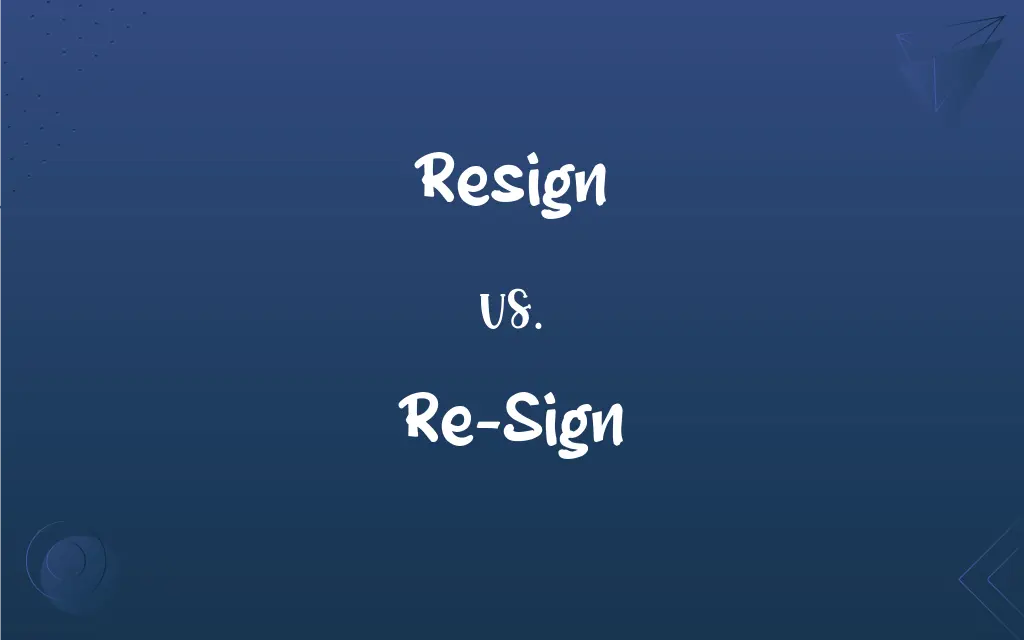Resign vs. Re-Sign: What's the Difference?
Edited by Aimie Carlson || By Janet White || Published on February 21, 2024
"Resign" means to quit a job or position, while "Re-Sign" refers to signing a contract or agreement again, often to extend its duration.

Key Differences
decision to give up or step down from a role. In contrast, Re-Sign means to sign again, often used in contexts like renewing a contract or continuing an agreement that was previously in place.
The act of resigning often includes submitting a resignation letter or notice. It's a formal process of ending employment or a role. Re-signing, however, involves the act of agreeing again to the terms of a contract or agreement, often in professional settings such as sports or employment.
Resignation typically signifies the end of an association with an organization or position. It can be due to various reasons like retirement, finding a new job, or personal reasons. On the other hand, re-signing usually indicates a continuation of an agreement, suggesting satisfaction with the current terms or conditions and a desire to maintain the relationship.
When someone resigns, it often leads to a transition period, where a replacement might be sought, or duties are handed over. In the case of re-signing, it generally leads to stability and continuation, as the individual or parties involved agree to extend their existing arrangement.
The motivations behind resigning can be diverse - dissatisfaction, new opportunities, personal growth, or external factors. In contrast, motivations for re-signing are typically centered around satisfaction with current conditions, benefits of continuity, or mutually favorable terms in a renewed agreement.
ADVERTISEMENT
Comparison Chart
Basic Meaning
To quit a job or position
To sign a contract or agreement again
Implication
Ending of current role or employment
Continuation or renewal of an agreement
Typical Context
Formal resignation from a position
Renewing contracts or agreements
Resulting Action
Transition, searching for replacement
Continuity in existing role or terms
Motivation/Reason
Diverse: dissatisfaction, new opportunities
Satisfaction, benefits of continuity
ADVERTISEMENT
Resign and Re-Sign Definitions
Resign
To give up a role.
He resigned as the chairman of the board.
Re-Sign
To sign a contract again.
The star player re-signed with the team for another season.
Resign
To quit formally.
He resigned from his position due to personal reasons.
Re-Sign
To renew an agreement.
She re-signed her lease for another year.
Resign
To submit a resignation.
After much thought, she chose to resign.
Re-Sign
To extend a current arrangement.
The actress re-signed with the studio.
Resign
To voluntarily leave a job.
She decided to resign from her teaching position.
Re-Sign
To agree to continue.
He re-signed his employment contract happily.
Resign
To step down from duties.
The CEO resigned for health reasons.
Re-Sign
To continue a professional relationship.
They happily re-signed their partnership agreement.
Resign
To submit (oneself) passively; accept as inevitable
I resigned myself to a long wait in line.
Re-Sign
To sign again
Re-signed the lease.
Re-Sign
To sign again; to provide one's signature again.
Re-Sign
(by extension) To sign a contract renewing or restarting a professional relationship, such as that of a professional athlete with a sports team.
Re-Sign
To affix one's signature to, a second time; to sign again.
FAQs
Can resigning be involuntary?
Resigning is usually a voluntary action.
What are common reasons for resigning?
Personal reasons, new opportunities, or dissatisfaction.
Does resigning require a formal process?
Yes, it often involves a formal resignation process.
What does re-sign mean?
To sign a contract or agreement again.
What does resign mean?
To voluntarily leave a job or position.
Is re-signing common in employment?
Yes, especially for contract renewals.
Is re-signing a formal process?
Yes, it involves officially signing new or extended agreements.
Does re-signing imply satisfaction?
Often, it indicates contentment with current terms.
Is a notice required to resign?
Typically, a notice or resignation letter is standard.
Are there legal implications to resigning?
It depends on contract terms and local labor laws.
Does resigning affect future employment?
It can, depending on the circumstances and industry.
Why do people re-sign contracts?
For continued employment or satisfaction with current conditions.
What happens after resigning?
There's typically a transition or handover period.
Can re-signing change contract terms?
Sometimes, terms are renegotiated during re-signing.
Can one resign verbally?
Formal resignations are usually in writing, but verbal notices can occur.
Does re-signing affect salary?
It can, especially if renegotiating terms.
Is re-signing automatic?
No, it requires mutual agreement.
Can re-signing be refused?
Yes, either party can choose not to renew.
Can a resignation be retracted?
Sometimes, if the employer agrees.
Does re-signing require a new contract?
Usually, it involves a new or amended contract.
About Author
Written by
Janet WhiteJanet White has been an esteemed writer and blogger for Difference Wiki. Holding a Master's degree in Science and Medical Journalism from the prestigious Boston University, she has consistently demonstrated her expertise and passion for her field. When she's not immersed in her work, Janet relishes her time exercising, delving into a good book, and cherishing moments with friends and family.
Edited by
Aimie CarlsonAimie Carlson, holding a master's degree in English literature, is a fervent English language enthusiast. She lends her writing talents to Difference Wiki, a prominent website that specializes in comparisons, offering readers insightful analyses that both captivate and inform.







































































